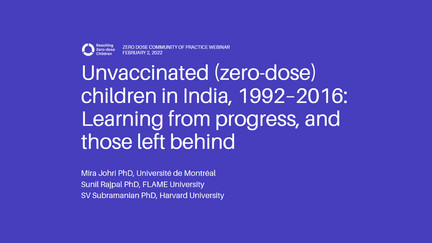
Date and time
Wed, Feb 2 2022
07:00 AM - 08:00 AM EST
Mira Johri PhD - Sunil Rajpal PhD - SV Subramanian,PhD
- Université de Montréal, Montréal, QC, Canada
- FLAME University, Pune, India
- Harvard University, Cambridge, MA, USA
During this webinar, Pr. Johri (PhD),Pr. Rajpal (PhD) and Pr. Subramanian (PhD) will present their work and participate to a discussion about their findings :
Reaching zero-dose children (infants who receive no routine vaccinations) is a global strategic priority. Using four rounds of nationally representative survey data, we studied the situation of zero-dose children in India over a 24-year timeframe from 1992 to 2016. Our aim was to trace aggregate trends and to clarify the contribution of large-scale social, economic, and geographical inequalities to child zero-dose status. Our results reveal that, over the 24-year analysis timeframe, the proportion of zero-dose children in India declined by 23·3% in absolute terms, with more rapid reductions among the worst off. Yet, despite tremendous progress, we found that child zero-dose status was shaped by large-scale social inequalities and remained a consistent marker of generalised vulnerability.
Please join us for a discussion of these findings, which yield insights relevant for Immunization Agenda 2030 into the complex causes of social disadvantage facing zero-dose children and the kinds of interventions that may be required to disrupt the cycle of intergenerational inequities.
Also : Link to the article
Johri M, Rajpal S, Subramanian SV. Progress in reaching unvaccinated (zero-dose) children in India, 1992–2016: a multilevel, geospatial analysis of repeated cross-sectional surveys. The Lancet Global Health. 2021;9(12):e1697-e706.